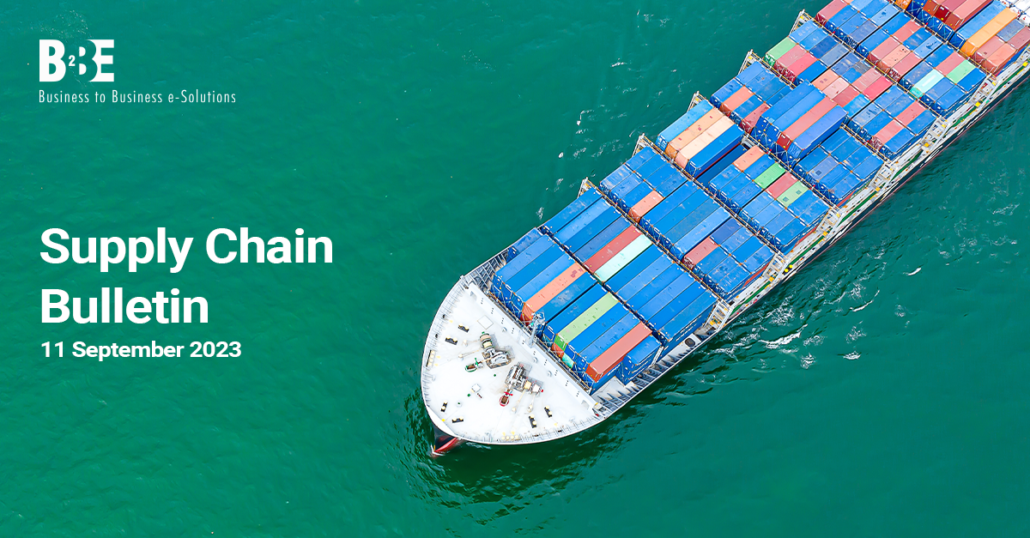This is your weekly supply chain bulletin from B2BE for the week starting 11th September 2023.
Each week, we bring you a rundown of the latest trends in the news from across the supply chain industry. We cover the issues most important to you, bringing you useful links to the full articles. This ranges from news on various supply chain disruptions to strategies to lessen the damage. We also include other relevant supply chain related updates. If you missed it, you can read last week’s supply chain bulletin edition here. Read on to see what’s making the news this week.
Australian supermarkets set to push supply chain costs onto customers
The Reserve Bank of Australia has revealed that supermarkets are more likely to be able to charge customers higher prices for their products during supply shocks and get away with it. A research paper by economists Callan Windsor and Max Zang analysed earnings calls of large corporations, including supermarkets, dating back to 2007. The analysis suggested that supermarkets, including major players like Coles and Woolworths, could raise prices during supply disruptions due to factors like breaks in supply chains. However, they might not face significant pushback. This is because customers tend to rely on their products and the demand for consumer staples is considered to be less responsive to price changes.
Coles and Woolworths, although not directly implicated in the research paper, have a 65 percent combined market share in Australia. Both have seen their profits rise amid a cost-of-living crisis. The research also highlighted that supermarkets, along with meat, fruit, and vegetable suppliers, are less likely to experience a downturn in demand if prices increase due to factors like bad weather or disruptions such as the COVID-19 pandemic.
Despite overall inflation moderating to 4.9 percent in July, consumers continue to feel the impact. Significant price increases were observed in categories like bread and cereal (9.9 percent) and dairy products (12.7 percent). While fruit and vegetable prices decreased by 5.4 percent over the year, meat and seafood prices increased by 2.4 percent, which is below the overall inflation rate. This data suggests that consumers are facing rising costs for essential goods.
Supply chain disruptions impacted 7% of UK businesses in July
In July, only 7 percent of trading UK businesses with 10 or more employees reported experiencing global supply chain disruption. That’s according to a survey by the UK Office of National Statistics (ONS). This figure remained broadly stable compared to June 2023. However, it’s worth noting that this is the lowest proportion reported since the question was introduced in December 2021.
The survey also revealed that 67 percent of these businesses were able to obtain the materials, goods, or services they needed from within the country without experiencing supply issues. When including businesses that had to change suppliers or find alternative solutions, this figure rose to 78 percent.
UK set to hold international summit to discus supply chain issues caused by the Russian invasion of Ukraine
The UK is set to host an international food summit in November. The summit will address food insecurity caused by disruptions in the supply chain resulting from the conflict between Russia and Ukraine. This summit will bring together government representatives, policy experts, and NGOs to coordinate support efforts. Additionally, the Ministry of Defence (MoD) will lead a surveillance and reconnaissance operation in the Black Sea to protect Ukrainian cargo ships.
The decision to hold this summit follows the breakdown of the Black Sea Grain Initiative. This was a UN-brokered agreement aimed at ensuring the safe export of food and fertiliser. Russia withdrew from the initiative in July, and both Russia and Ukraine have since declared that all ships approaching Black Sea ports would be considered military vessels.
The conflict has had a significant impact on Ukraine’s agricultural capabilities, affecting global grain supplies. Ukraine, often referred to as the “breadbasket of the world,” was a major exporter of wheat, corn, and rapeseed before the war. The disruption in its ability to produce and ship grain has contributed to a rise in global food insecurity, affecting hundreds of millions of people across numerous countries.
Tesla urges Australian government to give tax credits for battery investment
Tesla Inc. has urged Australia to provide tax incentives to encourage investment in the battery supply chain. Chair Robyn Denholm emphasized that Australia has the potential to become a hub for processing minerals used in battery manufacturing. She referenced the U.S. Inflation Reduction Act, which offers tax credits to producers, as a proven mechanism for attracting the necessary investment.
This move aligns with the global push to secure a stable and sustainable supply chain for electric vehicle (EV) batteries. EVs are becoming increasingly popular, and ensuring a reliable supply of batteries is essential for growth of the EV industry.
By incentivising investments in battery materials and manufacturing, Australia could position itself as a key player in the global battery supply chain, capitalising on its mineral resources. This could potentially create jobs and strengthen the country’s position in the growing EV market.
About B2BE
B2BE delivers electronic supply chain solutions globally, helping organisations to better manage their supply chain processes, providing greater levels of visibility, auditability and control. We’re driven by a passion for what we do, inspired by innovation, and underpinned by a wealth of knowledge. With over 20+ years of experience, the B2BE teams operate worldwide.
Ga voor meer informatie naar www.b2be.com.
